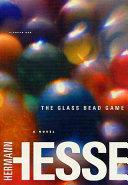Quotes from book
The Glass Bead Game

The Glass Bead Game is the last full-length novel of the German author Hermann Hesse. It was begun in 1931 and published in Switzerland in 1943 after being rejected for publication in Germany due to Hesse's anti-Fascist views. A few years later, in 1946, Hesse won the Nobel Prize in Literature. In honoring him in its Award Ceremony Speech, the Swedish Academy said that the novel "occupies a special position" in Hesse's work."Glass Bead Game" is a literal translation of the German title, but the book has also been published under the title Magister Ludi, Latin for "Master of the Game", which is an honorific title awarded to the book's central character. "Magister Ludi" can also be seen as a pun: ludus is a Latin word meaning both "game" and "school". However, the title Magister Ludi is misleading, as it implies the book is a straightforward bildungsroman. In reality, the book touches on many different genres, and the bulk of the story is on one level a parody of the biography genre.
